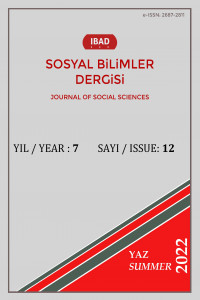Bâb-ı Meşihat Ulema Sicil Dosyalarına Göre Osmanlının Son Döneminde Görev Yapmış Akseki Doğumlu Müftüler
Öz
Anahtar Kelimeler
Kaynakça
- Cumhurbaşkanlığı Osmanlı Arşivi[BOA, DH.İD], 183/-2/46. BOA, MF. HUS, 12/94.
- Meşihat Arşivi, (MŞH.SAİD), 184/14; 4-4; 189/19; 230/7-1; 1813, 2636, 2669, 3933.
- Albayrak, S. (1996). Son Devir Osmanlı Uleması (Cilt 4). İstanbul: İstanbul Büyükşehir Belediyesi Yayınları. Ebül’ula Mardin. (2017). Huzur Dersleri (Cilt II-III). Ankara: Diyanet İşleri Başkanlığı Yayınları.
- Findley, C. V. (2011). Kalemiyeden Mülkiyeye Osmanlı Memurlarının Toplumsal Tarihi. (G. Ç. Güven, Çev.) İstanbul: Tarih Vakfı Yurt Yayınları.
- İmamoğlu, İ. H. (2019). Osmanlı Son Dönemi Karabük ve Çevresi Müftü Atamaları ve Toplumsal Hayat. A. Işık içinde, Uluslararası Geçmişten Günümüze Karabük ve Çevresinde Dini, İlmi ve Kültürel Hayat Sempozyumu (s. 410-420). Karabük: Karabük Üniversitesi Yayınları.
- Özkan, S. H. (2010). Osmanlı Devleti’nin Son Döneminde Merzifonlu Memurlar (1879-1909). e. H. Geçmişten Günümüze Merzifon. içinde Merzifon: Merzifon Belediyesi Kültür Yayınları.
- Özkan, S. H. (2011). Osmanlı’dan Cumhuriyet’e Gündoğmuş (Kise ve Nağlu Nahiyeleri). Konya: Alanya Ticaret Odası.
- Özlü, Z. (2006). XVIII. ve XIX. Yüzyılda Göynükte Fiyatlar. Bilig(39).
- Yakut, E. (2020). Osmanlı Devleti'nin Son Yıllarında Meşihat, Adliye Maarif ve Hilafet 1918-1922. İstanbul: Kitabevi.
- Yurdakul, İ. (216). Mekteb-i Nüvvâb. İslam Ansiklopedisi, Ek-2. Türkiye Diayanet Vakfı.
- Zerdeci, H. (1998). Osmanlı Ulema Biyografilerinin Arşiv Kaynakları. İstanbul: İstanbul Üniversitesi Sosyal Bilimler Enstitüsü.
Muftis Who Were Born in Akseki according to Ulama Registries of Meşihat Last Period of Ottoman Empire
Öz
Approximately 35.000 officials were employed during the reign of Abdulhamid II. As a result of this situation institutionalization and bureaucracy stood out in the state administration. Because of this, the state administration gained a more centralized appearance and there had been some radical changes on the subject of officials employment. One of these changes was the registry records which possessed biographical features. Other than officials, ulema (scholar) registers were also kept by the office of Sheikh al-Islam (Bâb-ı Meşîhat). Today there are a total of 6554 ulema registers files in Istanbul Muftiate Shari‘a Court Records Archive. These files include the payroll sheets, places of duty, medical reports of ulema and if there inheritors, the documents which show the survivor’s pension after the death of that ulama. Furthermore, in these files also include knowledge about the father and the family of the ulema, reputation, nickname and birthplace of the ulema.There are records of 64 ulema who were born in Akseki in the Ulema Registers Files. These ulema worked as qadis, naibs, shari‘a court scribes and guards, muftis, muderris (teachers), dersiam (a type of muderris) and religious officials in mosques. Most of these ulema worked as naibs. The most frequent positions in the registers files after naib are mufti and müderris. Five of the ulema who were born in Akseki worked as mufti. These muftis are Osman Efendi the Mufti of Kavala, Ahmed Hamdi Efendi the Mufti of Antalya, Mehmed Hilmi Efendi the Mufti of Akseki, Mehmed Hilmi Efendi the Mufti of Beyşehir and Ali Rıza Efendi the Mufti of Manavgat. In this work the biographies of these five ulema who worked as muftis out of 64 who were recorded in the Ulema Registries are tried to be presented. These registry files can be reached through Library of İSAM Centre for Islamic Studies Ulema Registers Files Database. Same database has been used to acquire the registry files during the research process of this work. The biographies of these individuals who were a part of the Ottoman Ilmiye were tried to be presented in an annotated manner by adhering to the texts in the registry records. At the same time while the biographies are being presented, a broad assessment has been tried to be achieved about the birth dates of the ulema and their marital status, educational status, places of duty and their salaries. Also, the salaries has been compared to the market prices of that specific time period to explain the living standards of these ulema.
Anahtar Kelimeler
Kaynakça
- Cumhurbaşkanlığı Osmanlı Arşivi[BOA, DH.İD], 183/-2/46. BOA, MF. HUS, 12/94.
- Meşihat Arşivi, (MŞH.SAİD), 184/14; 4-4; 189/19; 230/7-1; 1813, 2636, 2669, 3933.
- Albayrak, S. (1996). Son Devir Osmanlı Uleması (Cilt 4). İstanbul: İstanbul Büyükşehir Belediyesi Yayınları. Ebül’ula Mardin. (2017). Huzur Dersleri (Cilt II-III). Ankara: Diyanet İşleri Başkanlığı Yayınları.
- Findley, C. V. (2011). Kalemiyeden Mülkiyeye Osmanlı Memurlarının Toplumsal Tarihi. (G. Ç. Güven, Çev.) İstanbul: Tarih Vakfı Yurt Yayınları.
- İmamoğlu, İ. H. (2019). Osmanlı Son Dönemi Karabük ve Çevresi Müftü Atamaları ve Toplumsal Hayat. A. Işık içinde, Uluslararası Geçmişten Günümüze Karabük ve Çevresinde Dini, İlmi ve Kültürel Hayat Sempozyumu (s. 410-420). Karabük: Karabük Üniversitesi Yayınları.
- Özkan, S. H. (2010). Osmanlı Devleti’nin Son Döneminde Merzifonlu Memurlar (1879-1909). e. H. Geçmişten Günümüze Merzifon. içinde Merzifon: Merzifon Belediyesi Kültür Yayınları.
- Özkan, S. H. (2011). Osmanlı’dan Cumhuriyet’e Gündoğmuş (Kise ve Nağlu Nahiyeleri). Konya: Alanya Ticaret Odası.
- Özlü, Z. (2006). XVIII. ve XIX. Yüzyılda Göynükte Fiyatlar. Bilig(39).
- Yakut, E. (2020). Osmanlı Devleti'nin Son Yıllarında Meşihat, Adliye Maarif ve Hilafet 1918-1922. İstanbul: Kitabevi.
- Yurdakul, İ. (216). Mekteb-i Nüvvâb. İslam Ansiklopedisi, Ek-2. Türkiye Diayanet Vakfı.
- Zerdeci, H. (1998). Osmanlı Ulema Biyografilerinin Arşiv Kaynakları. İstanbul: İstanbul Üniversitesi Sosyal Bilimler Enstitüsü.
Ayrıntılar
| Birincil Dil | Türkçe |
|---|---|
| Bölüm | Araştırma Makaleleri |
| Yazarlar | |
| Yayımlanma Tarihi | 2 Ağustos 2022 |
| Kabul Tarihi | 28 Şubat 2022 |
| Yayımlandığı Sayı | Yıl 2022 Sayı: 12 |
Etik İlkeler ve Yayın Politikası |
This journal is subscribes to the principles of the Committee on Publication Ethics. |
IBAD Sosyal Bilimler Dergisi I (online) ISSN 2687-2811

